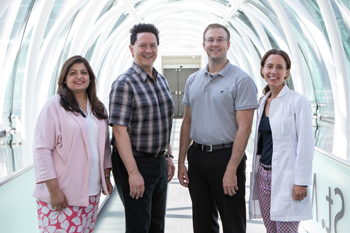New program to reduce unnecessary blood-sugar tests already seeing ‘significant’ results

By Amber Daugherty

(left to right) Shafqat Tahir, Drake Yip, Dr. Dan Beriault and Dr. Lisa Hicks
More is not always better and just because you can have a test done doesn’t mean it’s going to be useful – in fact, it can sometimes be counterproductive. A team at St. Michael’s Hospital has turned their sights to reducing the number of hemoglobin A1c (HbA1c) tests that are used to measure blood sugar average levels for people living with diabetes. Conducted too frequently, the test can be misleading.
“Hemoglobin A1C has a lifespan of three months within the blood, so when you repeat the test too soon, you’re not likely to get new results,” said Dr. Dan Beriault, head of biochemistry at the hospital. “So we’ve been working on reducing the number of these tests that happen unnecessarily to save patients from having blood drawn when it’s not needed.”
The team has implemented an automated hard stop so when an HbA1c test is ordered within 60 days of the last one being done, a notice will come up letting the provider know that they should check the last results instead. As a result of this practice, the team has reduced these tests by a total of six per cent a month across the hospital.
“It’s pretty significant – that’s more than 140 patients a month who don’t have to have blood drawn again,” Dr. Beriault said.
He explained that it’s often not the same physician ordering the test regularly – patients have multiple visits to different health care providers and specialists who may not know the test was done recently. And because these tests are often used to inform treatment going forward (someone with a high HbA1c level may be prescribed increased medication or lifestyle changes), getting a new result too soon might cause a health care provider to make additional changes that aren’t needed.
“It’s better if this test is done every three months so that the next reading has allowed time for any changes implemented after the last reading to work,” Dr. Beriault said.
The successful implementation of this hard stop has now led the team – consisting of Dr. Beriault, endocrinologist Dr. Julie Gilmour, St. Michael’s Choosing Wisely lead Dr. Lisa Hicks, information technology coordinator Drake Yip and laboratory quality and risk management manager Shafqat Tahir – to turn their sights to bringing it to St. Joseph’s.
“We’re really excited about the results and the impact this has already had for our patients,” said Dr. Beriault. “At the end of the day, it’s about making sure our patients are receiving the best care and getting the right information to help with that.”
About St. Michael’s Hospital
St. Michael’s Hospital provides compassionate care to all who enter its doors. The hospital also provides outstanding medical education to future health care professionals in more than 27 academic disciplines. Critical care and trauma, heart disease, neurosurgery, diabetes, cancer care, care of the homeless and global health are among the Hospital’s recognized areas of expertise. Through the Keenan Research Centre and the Li Ka Shing International Healthcare Education Centre, which make up the Li Ka Shing Knowledge Institute, research and education at St. Michael’s Hospital are recognized and make an impact around the world. Founded in 1892, the hospital is fully affiliated with the University of Toronto.
About Unity Health Toronto
Unity Health Toronto, comprised of Providence Healthcare, St. Joseph’s Health Centre and St. Michael’s Hospital, works to advance the health of everyone in our urban communities and beyond. Our health network serves patients, residents and clients across the full spectrum of care, spanning primary care, secondary community care, tertiary and quaternary care services to post-acute through rehabilitation, palliative care and long-term care, while investing in world-class research and education. For more information, visit www.unityhealth.to.
